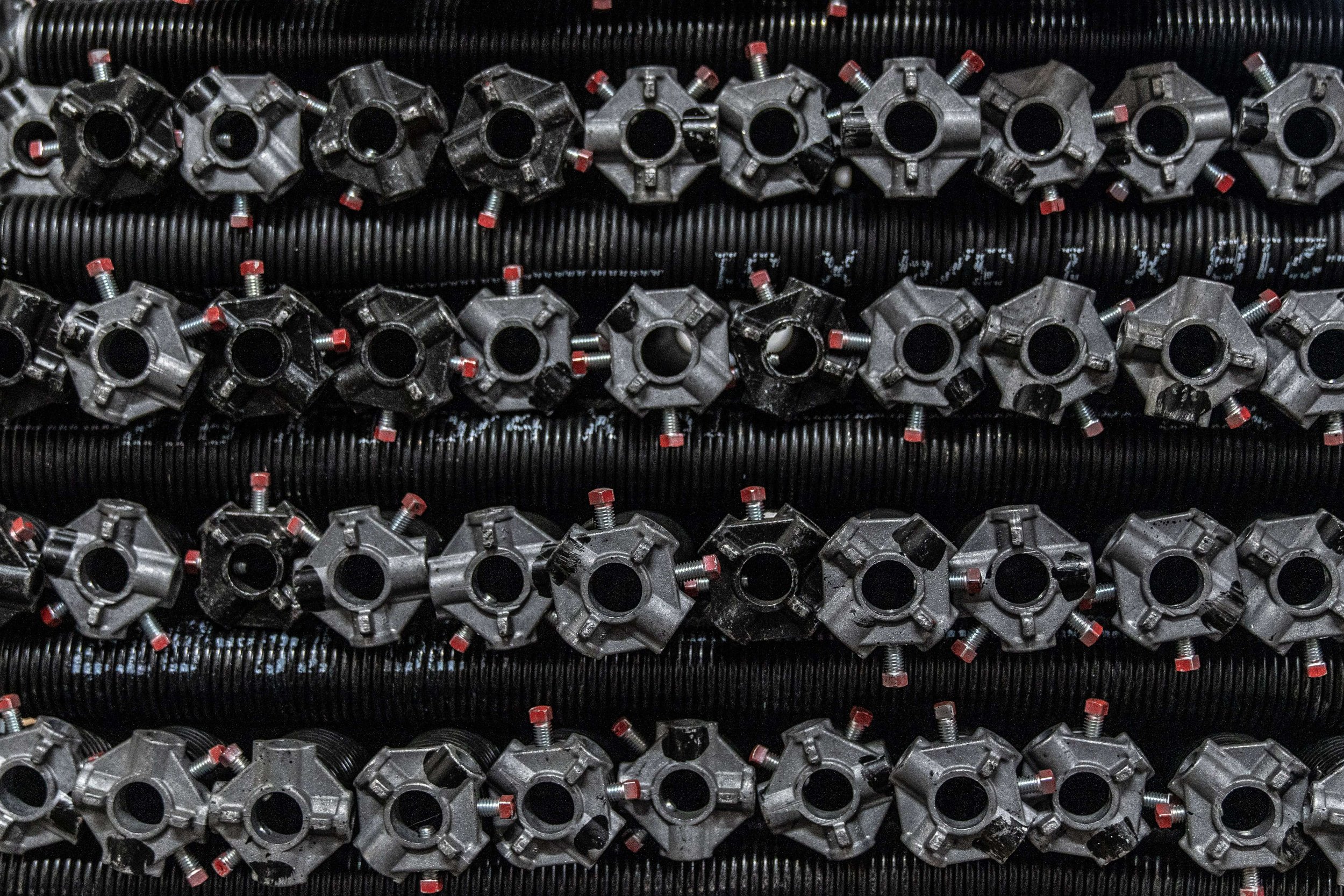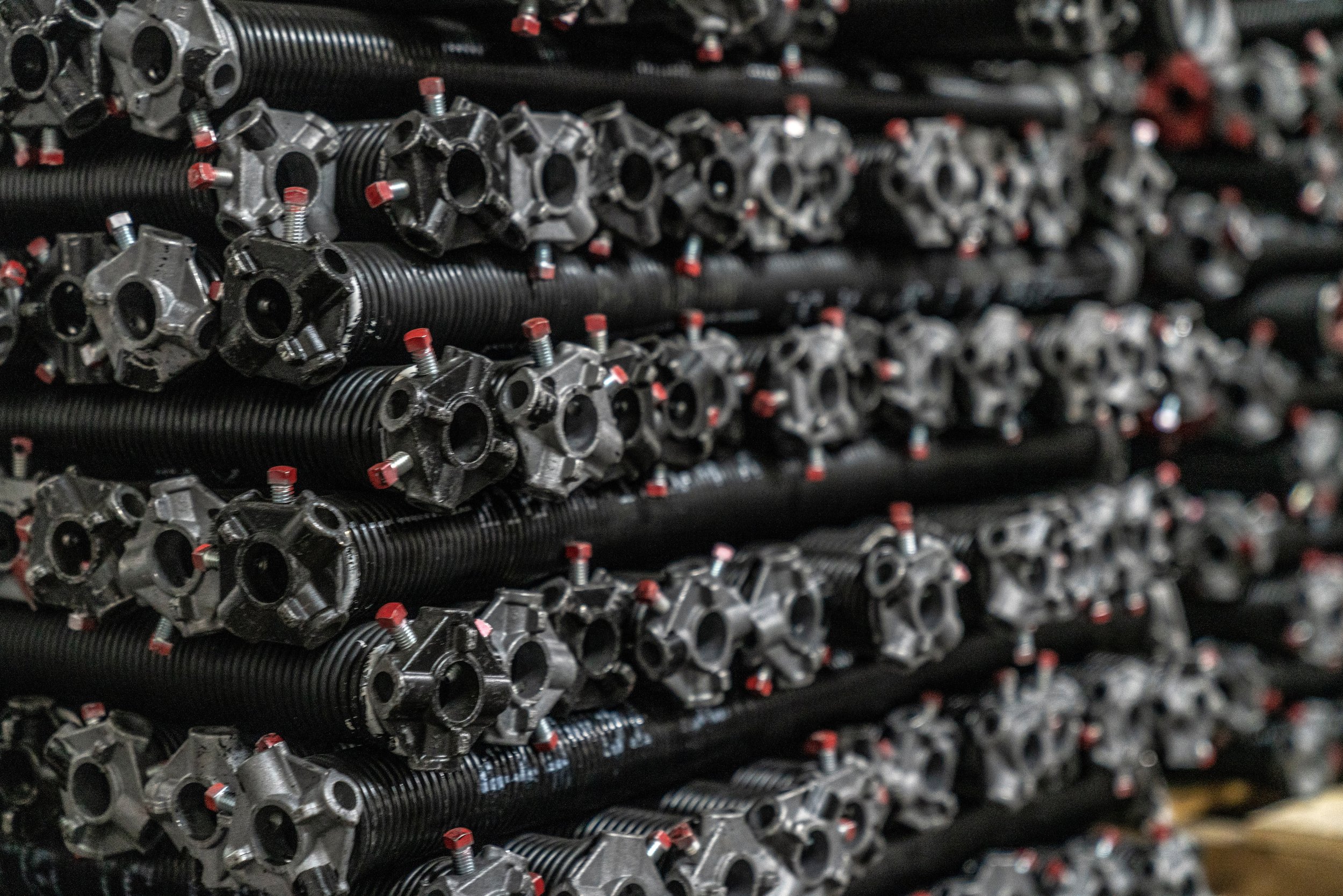Garage Door Spring Types - What Are The Differences?
The garage door is an often overlooked part of a home's exterior, but it's essential for keeping the contents of your garage safe and secure. Just like the engine of a car, your garage door has many working parts, including the springs. While you may not think about them much, garage door springs are incredibly important for proper function and safety.
There are different garage door spring types available because not all garage doors are created equal. Garage doors come in a wide range of sizes, weights, and designs, and each requires a specific type of spring to function properly.
If you're wondering what type of spring system is best for your home or which one you should replace on your existing door, this article will provide you with all the information you need to make an informed decision when choosing between the different types of garage door springs.
Why Garage Door Springs Are So Important
Garage door springs play a crucial role in maintaining the safe operation of your garage door. These springs are responsible for bearing the weight of the door as it opens and closes, which is no small feat considering the weight of a typical garage door.
Over time, garage door springs can become worn or damaged, which can lead to serious safety hazards. A malfunctioning spring can cause the door to fall suddenly, putting people or property in harm's way. Additionally, trying to repair or replace garage door springs without the proper training and tools can be extremely dangerous.
That's why it's important to have your garage door springs regularly inspected and maintained by a professional who has the knowledge and experience to identify and address any potential issues. With regular maintenance, you can help ensure that your garage door continues to operate safely and smoothly for years to come.
Overview of Garage Door Spring Types
There are two main types of garage door springs: torsion springs and extension springs.
Torsion Springs: Torsion springs are located horizontally above the garage door opening. They work by twisting and unwinding to lift the garage door. Torsion springs are usually made of steel and come in a variety of sizes depending on the weight of the garage door.
Extension Springs: Extension springs are located on either side of the garage door and stretch out to lift the door. They are typically made of steel and come in a variety of sizes depending on the weight of the garage door.
Roll-Up Springs: Roll-up springs are typically mounted on the shaft that supports the door's barrel, and they work by coiling and uncoiling to counterbalance the weight of the door as it opens and closes. These springs are generally larger and stronger than residential garage door springs, due to the heavier weight of the commercial doors they support.
There are also two subtypes of extension springs:
Open-Looped Extension Springs: These springs have an open coil and a hook or loop on one end, which is attached to a bracket on the garage door track.
Double-Looped Extension Springs: These springs have two coils that are connected with a loop in the center. One end of the spring is attached to a bracket on the garage door track, and the other end is attached to a pulley and cable that lifts the door.
Torsion Springs
Torsion springs are the most commonly used type of garage door spring and are located above the top panel. They are designed to counterbalance heavier doors and help reduce stress on other parts of the system. Torsion springs come in a variety of sizes, with each size being able to support a specific amount of weight.
For example, a 9-foot tall, 16x7-foot wide garage door would likely need two torsion springs that can support up to 250 pounds each. It's important to choose the right size for your system as using one that is too weak or strong can cause serious safety issues such as snapped cables or jammed doors.
Extension Springs
Extension springs are a popular choice for many homeowners due to their cost-effectiveness and ability to counterbalance lighter garage doors. These are another type of garage door spring that can be a great choice for many homeowners. They are designed to counterbalance lighter doors, making them easier to open and close. Extension springs use tension to help offset the weight of the door, which helps make them a more cost-effective option when compared with torsion springs. Additionally, extension springs can last longer than other types of springs because they have less tension on them.
Roll-Up Spring
Roll-up springs are an attractive option for many homeowners due to their smooth operation and reliability. Unlike extension springs, which use tension to counterbalance the weight of the door, roll-up springs are designed to be torsionally balanced. This allows them to smoothly open and close the door with minimal effort. Additionally, roll-up springs tend to be more reliable than extension or side mount springs, as they don't require high levels of tension in order to operate correctly. However, it's important to note that roll-up springs can be more expensive than other types of garage door springs due to their design and complexity.
Open-Looped Extension Springs
Open-looped extension springs are an efficient, cost-effective choice for many homeowners. This type of spring is designed to be mounted on either side of the door, allowing it to extend and contract as the door opens and closes. This makes open-looped extension springs a great option for uneven or off-center tracks. Additionally, these types of springs can typically support heavier doors than roll-up springs.
Open-looped extension springs also tend to be very affordable making them an excellent investment for those on a budget. However, they may require more maintenance due to their exposed construction. Additionally, because they're not torsion-balanced like roll-up springs, they may require more effort to open and close the door. Ultimately, it's important to weigh all the options before deciding which type of garage door spring is best for you.
Double-Looped Extension Springs
Double-looped extension springs are an excellent choice for those looking for durability and long-term performance. Unlike open-loop extension springs, double-looped designs offer increased strength and stability. This makes them ideal for heavier doors that require extra support. Additionally, these types of springs can easily be adjusted to fit any size door, allowing you to customize the tension level as needed.
Unlike open-looped extensions, double-looped extensions are covered in a heavy duty steel casing, which provides superior protection against weather elements and other external factors. This casing also helps reduce noise levels when your garage door is in use. Furthermore, double-looped designs typically require less maintenance than their open-loop counterparts, making them a great option for homeowners who want an efficient yet low maintenance spring system.
The Importance of Safety Cables
Safety cables are an essential part of any garage door spring installation. They provide extra support to the springs, helping to prevent them from breaking or snapping in the event of a sudden failure. Safety cables are typically made of steel and are attached to each side of the spring system with a U-bolt. The cable then runs along the length of the spring, providing additional support and stability.
For added safety, it is important that all safety cables be inspected regularly for signs of wear and tear such as fraying or corrosion. In addition, it is critical that safety cables be replaced immediately if any damage is detected. Properly installed safety cables can help prevent serious injury or even death due to a broken spring. For this reason, they should never be overlooked when installing or maintaining your garage door system.
In Need of a Garage Door Repair?
Choosing the right garage door spring is crucial for the proper functioning and longevity of your garage door. It's important to consult with a professional garage door repair service when making your decision.
At Old Town Garage Door Repair, our team of professionals specializes in garage door repair and installation services, including garage door spring replacement. We also offer emergency garage door repairs for those unexpected emergencies. If you're in need of garage door services in Murrieta, Temecula, Corona, Canyon Lake, or beyond, don't hesitate to reach out to us.
Contact us today by calling us at (714) 504-2582 or submit a contact form on our website to schedule an appointment with our expert technicians. Trust us to keep your garage door functioning smoothly and efficiently for years to come.
FAQs
-
Springs should generally be replaced every five to seven years, depending on their usage. It is important to inspect them regularly for signs of wear and tear, such as fraying or corrosion. If any damage is detected, they should be replaced immediately for safety reasons.
-
Yes, even if only one spring is broken, both of them must be replaced in order to ensure proper balance and even wear. This will also help to prevent further damage from occurring due to an unevenly loaded system. Additionally, replacing both springs together will help you save time and money since you won’t have to worry about doing the job twice.
It is important that any repairs or replacements are done by a professional technician who has experience with this type of work. Attempting to complete the job without proper training can lead to serious injury or property damage. Contact our team of experts here at Old Town Garage Door Repair Murrieta for any maintenance or repair needs you may have regarding your garage door springs!
-
On average, a garage door spring will last between seven to nine years before needing to be replaced. However, this time can vary depending on several factors such as the frequency of use and the quality of materials used in the construction. If your garage door is used frequently, its lifespan may be shortened to around four to six years.
It is important to keep an eye out for any signs that your springs are reaching the end of their life span such as loud noises when operating or difficulty in opening and closing your garage door. If you notice any issues with your springs, it is best to contact a professional technician for repair or replacement services in order to prevent any further damage from occurring



